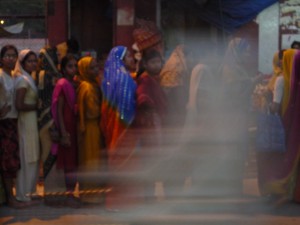Days in Banaras
 Terrible heat, Auntieji says, too much. The beads of my sweat so big they feel like fat ants slipping down my neck. My top is two shades darker with soak when I arrive at Ramuji’s house. The electricity is out, as it is every afternoon. He turns on the inverter and we sit under the ceiling fan, set to high. The blades are a blur and the center shakes, looking dangerously like it’s about to jostle itself loose and fall. We’re sitting on mattresses on the floor covered with block-printed sheets. There’s a curio-cabinet across from me. The bottom corner is stocked with Ayurvedic serums and pure attars in silver bottles. The rest of the cabinet is filled with images of Ganesh, of every imaginable shape, color, and size. Ramuji has made lunch, but I can’t imagine eating yet. It’s too hot to eat. Ramuji’s tabla-wallah arrives with his son, a shy, thin teenager with the beginnings of what I guess is his first moustache. I make a French Press with coffee that’s been sitting in Ramuji’s kitchen in a ziplock bag in summer heat for three months. It comes out muddy and weak, but still better than the instant Nescafe that passes for coffee here. The tabla-wallah goes to work adjusting the drums. He holds the tabla between his feet, pulling and readjusting the tan camelskin straps crisscrossed along the outside with a long blunt tool like an awl. The head of the drum is held in place by braided leather, and he goes to work on it with a silver hammer, whacking the edge from below. His feet slowly twist the tabla as he works his way around. Every inch or so he hammers, then taps his fingers onto the head, first gently with his nails, then pushing his palm from the edge to the far side like kneading dough, then slapping it. All the while he chews paan and looks over at Ramuji as they carry on their conversation. He nods his head and passes the tabla to Ramuji. When Ramuji hits the head over the black circle of gunmetal set just off from the center, the ring echoes sweet and long in the room. I don’t hear the fan anymore. I look over at the tabla-wallah’s son. I can tell he is as mesmerized as me, watching an expert so comfortably, so pleasurably at work.
Terrible heat, Auntieji says, too much. The beads of my sweat so big they feel like fat ants slipping down my neck. My top is two shades darker with soak when I arrive at Ramuji’s house. The electricity is out, as it is every afternoon. He turns on the inverter and we sit under the ceiling fan, set to high. The blades are a blur and the center shakes, looking dangerously like it’s about to jostle itself loose and fall. We’re sitting on mattresses on the floor covered with block-printed sheets. There’s a curio-cabinet across from me. The bottom corner is stocked with Ayurvedic serums and pure attars in silver bottles. The rest of the cabinet is filled with images of Ganesh, of every imaginable shape, color, and size. Ramuji has made lunch, but I can’t imagine eating yet. It’s too hot to eat. Ramuji’s tabla-wallah arrives with his son, a shy, thin teenager with the beginnings of what I guess is his first moustache. I make a French Press with coffee that’s been sitting in Ramuji’s kitchen in a ziplock bag in summer heat for three months. It comes out muddy and weak, but still better than the instant Nescafe that passes for coffee here. The tabla-wallah goes to work adjusting the drums. He holds the tabla between his feet, pulling and readjusting the tan camelskin straps crisscrossed along the outside with a long blunt tool like an awl. The head of the drum is held in place by braided leather, and he goes to work on it with a silver hammer, whacking the edge from below. His feet slowly twist the tabla as he works his way around. Every inch or so he hammers, then taps his fingers onto the head, first gently with his nails, then pushing his palm from the edge to the far side like kneading dough, then slapping it. All the while he chews paan and looks over at Ramuji as they carry on their conversation. He nods his head and passes the tabla to Ramuji. When Ramuji hits the head over the black circle of gunmetal set just off from the center, the ring echoes sweet and long in the room. I don’t hear the fan anymore. I look over at the tabla-wallah’s son. I can tell he is as mesmerized as me, watching an expert so comfortably, so pleasurably at work.
After they leave, we eat. Ramuji sacrifices some of his backup electricity to turn on the TV and check on how Sachin Tendulkar is faring in the Sri Lanka vs. India cricket test match. Lunch is subtly spiced zucchini, chapatti, and thick, fresh curd. I’m cross-legged on the floor now, and a drop of curd falls on the hem of my pants. Ramuji tells me it’s an auspicious sign. I lick the last of the curd from the unfired clay purva and Tendulkar hits his 200th run of the match, the fifth double century of his career. He removes his helmet from his matted, damp hair and raises his bat, smiling to the crowd. Then he shuts his eyes and tilts his head towards the sky, in prayer and exhaustion. After an hour of sitting under the fan, I’m still sweatier than him.
Tota calls me to ask if I can come over to take her photograph to be used for her passport. Her husband, Ramuji’s brother and also a tabla player, has received a government posting as some kind of cultural emissary in Russia. He’ll make good money there, after he pays off the loan he took to line the right pockets to get a placement in a good city, where he can find vegetarian food and English speakers. It cost him 1 lakh to get a posting in Moscow. There’s no electricity and Tota doesn’t have an inverter, so she waves a woven, paper fan. I’ve just eaten, but they insist I have a sweet. When I agree, they bring a plate of four, all cooked in pure ghee at Sankat Mochan, the Hanuman Temple where Narayan works. They’re prasad. I take small bites and steel my stomach, knowing I’ll have to eat all of them. Narayan does puja while I show Tota photos of the mountains at Gomukh and Gangotri. She’s amazed at how clean it is, and bemoans the pollution in Banaras. But at least we aren’t in Kanpur, she says, where the chemical pollution is so bad it makes young women look old before their time. She and Narayan do look younger than their ages; she insists they would look even younger yet if they lived in a cold country. At this, Tota remembers that I’m not adjusted to the heat, and reaches over to touch my skin to see how hot I am. She starts twirling the fan so fast it nicks me on the forehead. I offer her an orange with thick skin I was given as prasad at Chinta Mani yesterday, and we compare our planetary positions. Green is a good color for her, and she’s starting wearing it more since her recent accident. I’ve avoided wearing it as of late; it’s a bad color for me when I’m trying to make decisions.
I head back to Assi to do some work. Assi Crossing is even busier than usual. I inch forward, trying to merge behind a man pulling a large wooden cart behind his bicycle. He’s transporting eight goats somewhere. They’re bleating, tethered together and to the cart with thick, fraying twine. A line of sadhus, clad in orange and rudraksh malas and carrying large staffs, are walking somewhere. A car waits not so patiently for them to pass; I guess at how many goats could be packed into it. Across the way, I see what is causing the jam. A man is digging a hole into the street, shoveling mud and rocks out to one side. The hole is so deep his head barely sticks up above the road, but as always, traffic follows traffic, so he stays safe. I pass within a foot of him. Later, I pick up mangoes in the market near the university. The green langhra look small and bruised, like misshapen bananas. I choose two kilos of yellow, firm chousa, the last variety of the season. The seller asks for 100 rupees. It’s the same price I’ve been quoted in two other neighborhoods, so I hand him the bill. The seller next to him asks how much I paid. It’s a Banaras pastime, insisting other people have paid too much for something they could sell or buy at a better deal. I’ve picked up the habit of saying I paid ten or twenty percent less than I actually did whenever people ask. But I know he’s overheard, so this time I don’t lie. He tsk-tsks my response; he would have only charged me 40 rupees per kilo. I shrug my shoulders and look back over at the other seller. He calls me back over and hands me a ten rupee note. I nod at both and unlock my cycle.
We have the chousa after dinner. I eat neatly sliced pieces, while the pits, with the sweetest, juiciest meat, go to Auntieji to be cleaned. My hands are dripping with sticky, orange juice by the time I finish. Somehow, Auntieji has artfully thumbed off the last bits of meat from the pit without getting any juice past her knuckles. After dinner I go to the roof and watch the neighbors set their mattresses down to sleep outside for the night. There’s a cool breeze. I take big, deep breaths. Days in Banaras pass like this.






